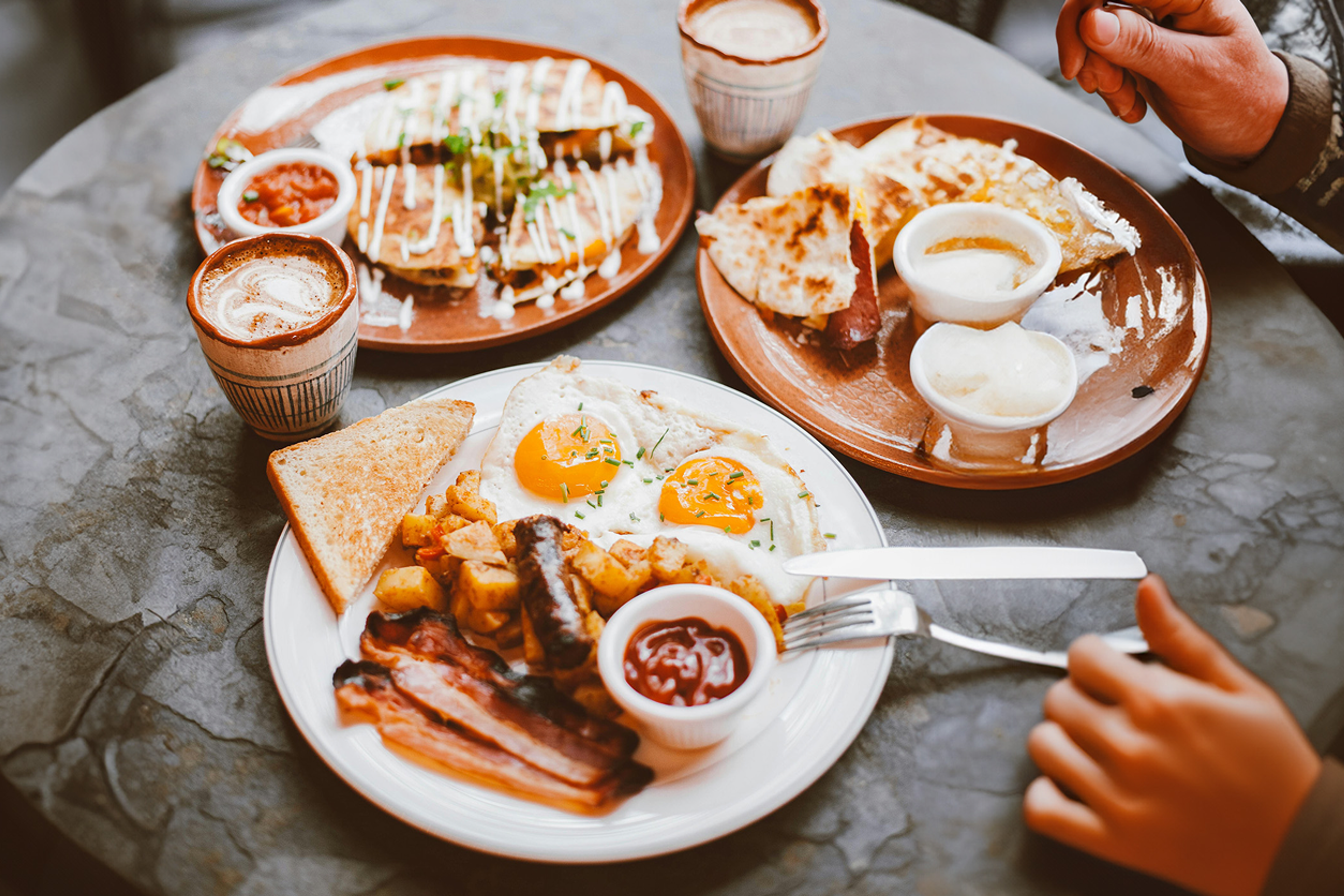


If you’ve spent any time in the world of eating disorders, you’ve definitely come across the term “diet culture” a few times. There’s a reason for that: diet culture is a powerful force that affects all of us, whether we realize it or not, and challenging it is a big part of recovery. But what is diet culture, anyway? Read on to understand what, exactly, we mean when we talk about diet culture and more details about the connection between diet culture and eating disorders.
What is diet culture?
Research has defined diet culture as a societal norm that considers thin bodies to be more desirable than other body types. Not only are thin bodies deemed “better” in aesthetic terms, they’re also thought of as more “righteous” and “superior” than large bodies, which are thought of as “immoral” and “inferior.” Diet culture is characterized by myths about health and food, like the false notion that weight is equivalent to—and a direct representation of—health.
Because diet culture values thinness above all, it also puts the pursuit of thinness on a moral pedestal. In other words, if you’re not thin or aspiring to be so, diet culture works to make you feel guilty, less worthy, or even oppressed. This belief system has been associated with negative outcomes, and, along with other factors, can be a contributing cause of eating disorders.
Some of the core tenets of diet culture are:
- Considering weight loss to be inherently good and desirable for everyone
- Conflating thinness with health
- Encouraging external rules about how much, what, or when to eat
- Deeming certain people more or less worthy based on their body size
- Holding up thin privilege, which makes it difficult for people in large bodies to access jobs, benefits, basic comforts, and more
- Positioning exercise as compensation for eating or punishment for being fat
- Establishing certain foods and ways of eating as “good” and others as “bad”
- Promoting excessive exercise and judging those who work out less
Diet culture is prevalent and appears to be ever-growing. According to the Centers for Disease Control and Prevention (CDC), between 2015 and 2018, 17.1% of U.S. adults aged 20 and over were on a special diet on a given day. In 2024, a Marketdata LLC analysis reported that the U.S. weight-loss market was estimated to have grown to a historic peak of $90 billion in the previous year, boosted by sales of GLP-1 prescription weight loss drugs.
How to spot diet culture
Unfortunately, diet culture is everywhere in the world we live in—and the more you know what to look for, the more you’ll realize how inescapable it is. Equip dietitian Emily Tauschek, RDN, CN, describes some of the ways that diet culture exists in everyday life: “Diet culture shows up as telling someone they don’t look fat—which implies that being fat is a bad thing—and normalizing disordered behaviors like having coffee for breakfast or drinking water instead of eating.”
Some more common examples of diet culture in action include:
- Complimenting someone’s weight loss
- Food packaging or descriptions that imply a food’s moral value (“healthy,” “guilt-free,” etc.)
- The idea that food is “earned” by burning calories through exercise or physical activity
- Restrictive diets masquerading as not being diets (Noom, Whole30, etc.)
- Photoshopped images on social media
- Moralizing food (i.e. saying you’re being “bad” for choosing fries instead of salad)
- Considering “thin” to be shorthand for “healthy”
- Body policing (i.e. monitoring, commenting on, or judging others’ bodies)
- Rebranding diet products or behaviors as “wellness”
- Social media algorithms that promote posts reinforcing the thin ideal

How diet culture relates to “wellness”
Since the early 2010’s, a lot of diet culture has morphed into “wellness,” another system of beliefs that says it has nothing to do with weight loss but, in fact, continues to value thinness above everything else. “In recent years, diet culture has been sneakily disguised as a ‘wellness’ or ‘lifestyle’ change,” says Tauschek. “But these ‘new’ diets still promote rigid eating patterns that ignore your internal hunger cues, have long lists of foods to always avoid, and endorse restricted intakes below your baseline energy needs.”
How diet culture affects us
Diet culture not only has a huge impact on individual people, it also affects the economy. An estimated 45 million Americans diet every year, and our country spends upwards of $30 billion on diet and weight loss products annually. This means that the diet industry is massive, and it benefits by convincing us that our bodies aren’t okay as they are—that we need to continually consume media and products that will help us become smaller. In other words, for the industry to continue being flooded with money, more people need to feel unworthy; and to make people feel unworthy, diet culture needs to spread.
The toxic effects of diet culture
Dieting rarely works—evidence suggests that most dieters regain the weight within a few years—but it can have serious and long-lasting consequences. For one, repeated cycles of gaining, losing, and regaining weight can increase the risk of heart disease and insulin resistance. Dieting also has negative cognitive effects, resulting in an obsession with food. What’s more, when you’re continually striving for an unachievable body (and being told left and right that you’re a failure for not achieving it), feelings of unworthiness, guilt, and shame aren’t far behind.
Because diet culture is rooted in a framework that idolizes thinness, it perpetuates weight bias—i.e. negative attitudes and stereotypes about people in larger bodies. This bias manifests as weight stigma, or discrimination and prejudice against these individuals. Research shows that weight stigma is linked to disordered eating behaviors and avoidance of physical activity, which can create a harmful cycle of further stigmatization.
Diet culture also contributes to weight cycling (the repeated pattern of losing and regaining weight, also known as "yo-yo dieting”). Research has shown a significant link between weight cycling and increased risk of cardiovascular disease, high blood pressure, and all-cause mortality. While it’s important to note that there is a strong association between weight fluctuation and these health outcomes, researchers agree that more studies are necessary to determine whether there is a causal relationship.
When it comes to weight stigma and cycling, there are some important myths to be aware of:
Myth: Diets work long-term.
Fact: After initial rapid weight loss, most people experience a plateau and then progressive regain. This is not due to a lack of willpower, but is driven by physiological responses to weight loss that increase appetite and decrease energy expenditure.
Myth: Your body is healthier when you weigh less.
Fact: Weighing less does not automatically translate to being healthier, and research has shown that being underweight can lead to worsened anxiety and depression, compromised bone health, weakened immunity, impaired digestion, increased risk for developing an eating disorder, and more.
Myth: Shame can help motivate health.
Fact: Shaming does not make people healthier—in fact, the stigma perpetuated by shame undermines motivation and promotes anxiety, low self-esteem, and a belief that something is fundamentally wrong with the person. Lasting health improvements are better achieved through compassion, self-acceptance, and intrinsic motivation, rather than negative self-talk or external pressure
Can diet culture lead to eating disorders?
The short answer is, yes. Research has shown that dieting is the most important predictor of new eating disorders and that food restriction can increase the risk of eating disorders in people who are susceptible to developing them. According to a report by the American Academy of Pediatrics, young people who dieted moderately were five times more likely to develop an eating disorder, and those who followed extreme diets were 18 times more likely.
This relationship makes sense, given we know that a negative energy balance (expending more calories than you consume) can be a trigger for certain eating disorders. We also have reason to believe that all eating disorders are ultimately rooted in restriction, which means that dieting is a major risk factor for those who are otherwise vulnerable. Additionally, diet culture is a big contributor to poor body image, and body dissatisfaction has been linked to the development of an eating disorder.
“While we may never know a singular cause for a person’s eating disorder, we can’t discount the pervasive nature of diet culture,” says Equip therapist Maddie Friedman, LCSW. “Eating disorders are brain disorders, meaning that they don’t take place in a vacuum without genetic influence. So if we imagine that genetics are the match, diet culture is often the spark, or the environmental trigger that sets an eating disorder ablaze.” Here's a guide on how to tell the difference between a diet vs an eating disorder.
Social media, “wellness,” and diet culture today
With the rise of social media, diet culture has unfortunately continued to grow and spread in new ways.
TikTok in particular has been found to play a significant and often harmful role in perpetuating diet culture through its algorithm and content trends: interacting with weight loss or "healthy eating" content can quickly lead to an endless stream of similar videos, creating a dangerous feedback loop. Additionally, research has shown that TikTok content glorifies weight loss and frames food in terms of achieving thinness, and that the majority of creators are young, white, and female, with average or thinner-than-average body sizes. Expert voices in nutrition and health are often notably absent from these online conversations, and evidence suggests that exposure to these types of videos could lead to disordered eating behaviors and body dissatisfaction among young users.
While it may not be possible to completely avoid social media in our modern world, there are some strategies you can use to help you (or a loved one) identify credible nutrition information and filter out triggering content:
- Look for content creators who are eating disorder-trained psychotherapists, medical doctors, or registered dietitians (RD). If you find yourself engaging with or listening to the advice of an online expert, do a quick Google search to confirm their legitimacy.
- Be wary of posts that lack scientific backing. Look for information that is supported by clinical studies and comes from reputable health organizations.
- Look for signs of misinformation, such as claims of guaranteed, effortless, or rapid results.
- Actively seek out and follow accounts from creators with diverse body types.
- Use TikTok’s "not interested" button to tell the algorithm to show you less of the types of content that are triggering, harmful, or not factual.
- If you’re a parent, consider putting parental controls on your child’s social media accounts (if you want more guidance on protecting your child from harmful social media content, this in-depth article is a good resource).
Anti-diet culture: practical ways to push back
Diet culture is so strong that it can feel like gravity. But unlike gravity, resisting its pull isn’t futile: while the force of diet culture will likely continue to exist for a while (until we, as a society, can dismantle the industries and systems holding it up), there are things you can do to avoid being dragged down by it:
1. Focus inward
Remember that only you are an expert on your body and your unique levels of hunger, fullness, and satisfaction. External diet plans or food rules take the power away from your body’s innate wisdom.
2. Take stock of subconscious beliefs
Examine the ways that weight stigma and diet culture have shaped your view of health, nutrition, and fitness; look closely, because you’ve likely been impacted even if you think you haven’t. By building an awareness of how diet culture appears in your own life, you can label it when it shows up, and this simple act can strip diet culture thoughts of some of their power.
3. Diversify your social media feeds
“There’s so much information on social media about health and weight that’s simply false, and it’s supported by a billion-dollar weight loss industry that depends on diet culture and weight bias,” says Friedman.
As a first step to remove this type of content from your life, get rid of “wellness” influencers who post content that makes you feel bad about yourself or guilty; then take some time to follow people of all body sizes and shapes. Seek out opportunities to hear the lived experiences of people harmed by diet culture and anti-fat bias.
It’s also important to cultivate healthy skepticism. Remember, it doesn’t take any certification or training to post a diet tip on Instagram. Don’t assume the information you read or hear from friends and family is true; and, even if it is, don’t assume it needs to impact your life or your choices.
4. Seek the right support
If you’re looking for more professional support navigating the world of diet culture, there’s a growing number of Health At Every Size experts who can help.
5. Brush up on media literacy
By learning more about how to interpret and understand media, you can start to critically analyze and deconstruct the harmful messages and unrealistic body ideals that promote diet culture. Ask yourself critical questions (like, “who benefits from me believing this post?”) and check your sources, and you’ll begin to see all the deceptive tactics (like digital manipulation and persuasive marketing) that show up in both traditional and social media.
6. Find weight-inclusive care
Weight-inclusive care promotes health and well-being at every size, shifting the focus from weight loss to sustainable, health-promoting behaviors. Rather than centering health around the number on a scale, weight-inclusive care can help you build a more positive and respectful relationship with your body.
7. Script responses to shut down body talk
Creating pre-written responses, or scripts, to shut down body talk, set boundaries, and redirect conversations is a powerful way to push back on diet culture. For example, if someone provides unwelcome commentary on your food or weight, you can script a response like, "I'm working on having a better relationship with food and my body, so I'd appreciate it if we could talk about something else."
When to seek help
Diet culture is inherently dangerous and can quickly spiral into disordered eating for anyone who’s susceptible to developing an eating disorder. It’s important to get help as soon as possible if your focus on food, weight, or body shape begins to severely disrupt your daily life, relationships, and emotional well-being. You don’t need to have a clinical diagnosis to deserve help and support.
If you feel shame or guilt around eating, engage in secretive eating or purging behaviors, or compulsively exercise to "earn" food, it’s time to get help. If you or a loved one are experiencing any of these issues, speak to a doctor or an eating disorder professional about your concerns, or schedule a call with an Equip team member.
So, what is diet culture? It’s a seemingly inescapable force that strives to make us feel bad about ourselves and our bodies every day. But here’s what diet culture is not: it is not a life sentence; it is not an inevitability; it is not the truth. And as more of us become aware of these essential realities, we can continue to make its force ever weaker.
FAQ
What does “diet culture” mean?
"Diet culture" refers to a societal belief system that values thinness and equates it with health and moral worth. It promotes restrictive eating, calorie counting, and a constant focus on weight loss, often leading to a negative relationship with food and one's body.
Is diet culture toxic or harmful? Why?
Yes. Diet culture perpetuates weight stigma by making thinness a moral and social ideal, leading to discrimination against people in larger bodies. This mindset also fuels weight cycling—the harmful cycle of losing and regaining weight—which can have negative effects on both physical and mental health.
How many people are dieting?
An estimated 45 million Americans diet every year. According to the Centers for Disease Control and Prevention (CDC), between 2015 and 2018, 17.1% of U.S. adults aged 20 and over were on a special diet on a given day.
How big is the diet industry?
The U.S. weight-loss market was estimated to have grown to a historic peak of $90 billion in 2023, boosted by sales of GLP-1 prescription weight loss drugs.
Does dieting cause eating disorders?
Yes, it can. Research has shown that dieting is the most important predictor of new eating disorders and dieting or food restriction can increase the risk of eating disorders in people who are susceptible to developing them.
- Nahin RL, Barnes PM, Stussman BJ. Expenditures on complementary health approaches: United States, 2012. (433KB PDF) National Health Statistics Reports. Hyattsville, MD: National Center for Health Statistics. 2016, https://www.nccih.nih.gov/research/research-results/americans-spend-30-billion-a-year-outofpocket-on-complementary-health-approaches.
- Rena R Wing, Suzanne Phelan, Long-term weight loss maintenance, The American Journal of Clinical Nutrition, Volume 82, Issue 1, July 2005, Pages 222S–225S, 10.1093/ajcn/82.1.222S.
- Welti LM, Beavers DP, Caan BJ, Sangi-Haghpeykar H, Vitolins MZ, Beavers KM. Weight Fluctuation and Cancer Risk in Postmenopausal Women: The Women's Health Initiative. Cancer Epidemiol Biomarkers Prev. 2017 May;26(5):779-786, 10.1158/1055-9965.EPI-16-0611.
- Hart, K.E. and Chiovari, P. (1998), Inhibition of eating behavior: Negative cognitive effects of dieting. J. Clin. Psychol., 54: 427-430, https://doi.org/10.1002/(SICI)1097-4679(199806)54:4<427::AID-JCLP4>3.0.CO;2-K.
- Neville H. Golden, Marcie Schneider, Christine Wood, et al. COMMITTEE ON NUTRITION, COMMITTEE ON ADOLESCENCE, SECTION ON OBESITY; Preventing Obesity and Eating Disorders in Adolescents. Pediatrics September 2016; 138 (3), https://doi.org/10.1542/peds.2016-1649.
- Minadeo, Marisa, and Lizzy Pope. “Weight-normative messaging predominates on TikTok-A qualitative content analysis.” PloS one vol. 17,11 e0267997. 1 Nov. 2022, doi:10.1371/journal.pone.0267997







